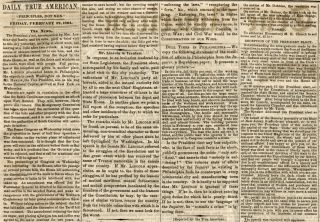
“There must have been something more than common that those men struggled for,” Abraham Lincoln said in his address to the New Jersey Senate on February 21, 1861. Making his way toward Washington and his inauguration, Lincoln accepted invitations to address both the New Jersey Senate, and shortly thereafter, the New Jersey General Assembly. He began by recalling the hardships of the winter of 1776, the crossing of the Delaware, and the Battle of Trenton. In a few words, he defined the American Revolution as “a great promise to all the people of the world to all time to come,” and hoped that he might be a fit instrument “for perpetuating the object of that great struggle.”
The two chambers were crowded with spectators anxious to hear the president elect. Many were anxious about his intentions. Lincoln had won four of the state’s seven electoral votes but only forty-eight percent of the popular vote. The majority of the popular vote had been divided between Democrats Stephen Douglas, John C. Breckinridge and John Bell. The speaker of the New Jersey General Assembly, a Democrat named Frederick Teese, introduced Lincoln with assurances that “the descendants of those whose blood was shed in the cause of liberty upon this soil, of the continued devotion of this state to the Constitution and Union founded by our fathers.” The audience interrupted Lincoln with applause several times, but the Democratic press was not so generous. The Daily True American, a Democratic paper, criticized Lincoln for offering “unmeaning, non-committal” remarks and urged the president elect to consider “the lessons of mutual sacrifices, mutual forbearance and mutual compromises inculcated by the founders of the government and the framers of the Constitution” (see the report in the second column above). For Lincoln, the legacy of the Revolution lay in ideals of liberty and Union. For many northern Democrats, the legacy of the Revolution also included a spirit of compromise and mutual accommodation.
Mr. President and Gentlemen of the Senate of the State of New-Jersey: I am very grateful to you for the honorable reception of which I have been the object. I cannot but remember the place that New-Jersey holds in our early history. In the early Revolutionary struggle, few of the States among the old Thirteen had more of the battle-fields of the country within their limits than old New-Jersey. May I be pardoned if, upon this occasion, I mention that away back in my childhood, the earliest days of my being able to read, I got hold of a small book, such a one as few of the younger members have ever seen, “Weem’s Life of Washington.” I remember all the accounts there given of the battle fields and struggles for the liberties of the country, and none fixed themselves upon my imagination so deeply as the struggle here at Trenton, New-Jersey. The crossing of the river; the contest with the Hessians; the great hardships endured at that time, all fixed themselves on my memory more than any single revolutionary event; and you all know, for you have all been boys, how these early impressions last longer than any others. I recollect thinking then, boy even though I was, that there must have been something more than common that those men struggled for; that something even more than National Independence; that something that held out a great promise to all the people of the world to all time to come; I am exceedingly anxious that this Union, the Constitution, and the liberties of the people shall be perpetuated in accordance with the original idea for which that struggle was made, and I shall be most happy indeed if I shall be an humble instrument in the hands of the Almighty, and of this, his almost chosen people, for perpetuating the object of that great struggle. You give me this reception, as I understand, without distinction of party. I learn that this body is composed of a majority of gentlemen who, in the exercise of their best judgment in the choice of a Chief Magistrate, did not think I was the man. I understand, nevertheless, that they came forward here to greet me as the constitutional President of the United States — as citizens of the United States, to meet the man who, for the time being, is the representative man of the nation, united by a purpose to perpetuate the Union and liberties of the people. As such, I accept this reception more gratefully than I could do did I believe it was tendered to me as an individual.
Roy P. Basler, ed., The Collected Works of Abraham Lincoln (8 vols., New Brunswick, NJ: Rutgers University Press, 1953), 4: 235-36.